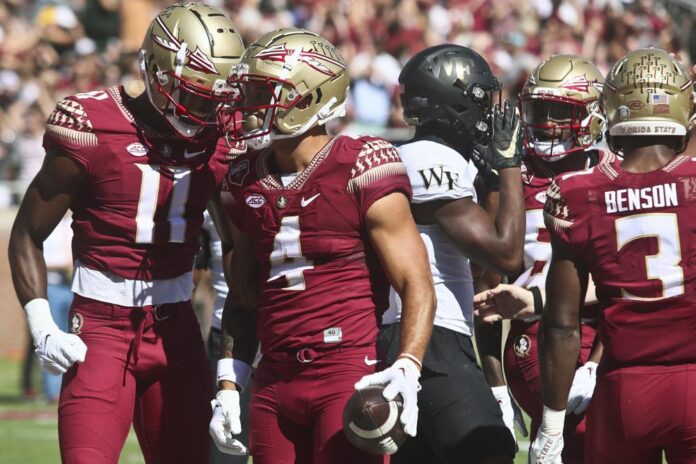
CHARLOTTE, N.C. (AP) — Commissioner Jim Phillips firmly believes in the future of the Atlantic Coast Conference amid the uncertainty of realignment and the wholesale changes to the model of college athletics itself.
He was ready to tell everyone why, too, as the league opened its preseason football media days Monday.
Trading his typically reserved comments for a more assertive message, Phillips touted the gains made from years of working to improve the ACC’s financial standing. He promised the league will fight “as long as it takes” in legal cases against Florida State and Clemson as those member schools challenge the league’s ability to charge hundreds of millions of dollars for leaving the conference. And he came bearing specifics, from dollar amounts to recent national-title counts.
“This league is better than the narrative that it’s getting right now because people want to talk about what may happen instead of about what is happening,” Phillips said in an interview with The Associated Press.
The league opened its four-day “ACC Kickoff” event Monday in an expanded format after the additions of California and Stanford from the Pac-12, and SMU from the American Athletic Conference. Phillips, preparing for his fourth full season leading the ACC, pulled back the curtain a bit on a league that he described as “aggressive” in battling a growing revenue gap behind its Big Ten and Southeastern Conference peers.
“Our M.O. has not been to do this in the public eye,” Phillips told the AP. “Ours is to do it internally, to be aggressive, and to look at every avenue possible for us to grow the revenue. … That will continue, not only what we’ve done and what we’re going to do in the future.”
For example, Phillips said the league’s addition of the three new schools will create $600 million in additional incremental revenue gains through the ACC’s current ESPN deal running through 2036. Additionally, a league that has long leaned on equitable distributions has Cal and Stanford taking reduced payouts (around 30%) through the first seven seasons before gradually increasing those amounts to a full share in the 10th season, while SMU is forgoing nine years of TV money.
Additionally, there’s this season’s launch of a success-driven incentive model with schools able to keep more money based on their own postseason success instead of sending them to conference coffers to be divvied up evenly. Phillips said that could amount to $20 million to $25 million in additional payouts for schools based on success in the College Football Playoff, bowl games and the NCAA men’s basketball tournament.
Throw in corporate partnerships and sponsorships of marquee events like the high-profile men’s basketball tournament earlier this year, and Phillips is pointing to multiple revenue streams to enhance the bottom line.
“I think we’ve done a really good job in a challenging situation to generate the revenue we’ve generated, new revenue,” Phillips said. “To also be able to unanimously accept disproportionate revenue for the first time with the success initiative and (expansion), that takes alignment. That’s not easy to do.
“The idea is we have to continue this kind of forward momentum into the future. So we have to be creative.”
The good news is those measures come amid years of record revenues, even though the ACC lags behind what many regard now as a Power Two with the Big Ten and SEC.
According to tax documents, the ACC distributed an average of $44.8 million to its 14 football-playing members (Notre Dame receives a partial share as a football independent) and $706.6 million in total revenue for the 2022-23 season. That marked an increase of 13.6% in payouts from the previous year, with Phillips saying increases in the league’s TV contract accounted for roughly two-thirds of that bump.
Additionally, TV revenue has increased from roughly $288.6 million in the 2018-19 fiscal year before the launch of the ACC Network to $481.7 million for 2022-23, an increase of 66.9%.
Overall, the ACC ranked third behind the Big Ten ($879.9 million revenue, $60.3 million average payout) and SEC ($852.6 million, $51.3 million) in the most recent filings, and ahead of the smaller Big 12 ($510.7 million, $44.2 million). Of that quartet, the SEC (six), Big Ten (two) and ACC (two) have combined to win all 10 CFP championships leading into its expansion to a 12-team field for this season.
“All the data says it’s a top-3 conference,” said SMU coach Rhett Lashlee said of the Mustangs’ new home.
And those revenue numbers don’t factor in the recent wave of realignment that tore apart the Pac-12 and scattered its pieces throughout the ACC, Big Ten and Big 12, as well as sending the Big 12’s two top football brands (Texas and Oklahoma) to the SEC.
Still, Phillips knows the league faces challenges beyond money.
He called the lawsuits filed by FSU and Clemson “extremely damaging, disruptive and harmful” during his annual forum. Most notably, those schools are challenging the league’s grant-of-rights media agreement that gives the ACC control of media rights for any school that attempts to leave for the duration of its ESPN deal. League schools signed that agreement in the lead-up to the ACC Network’s 2019 launch.
The league has also sued those schools to enforce the agreement in a legal dispute that has no end in sight and leaves everyone likely locked in position.
“I can say that we will fight to protect the ACC and our members for as long as it takes,” Phillips said emphatically during the forum.
Asked later about his comments, Phillips told the AP: “It’s important for our membership to know, as well as the country, where we’re at.”
Still, there were the awkward optics that came with Florida State being among the schools featured after Phillips’ forum. For Seminoles coach Mike Norvell, there was little to say beyond trying to win a second straight title in a league that FSU is also pushing to exit.
“Life is full of distractions,” Norvell said. “At the end of the day you stay focused on the things that are in front of you and ultimately the things that you can control. I’m fortunate to have the responsibility to help lead this team and that is where my focus is going to be.”
___
Get poll alerts and updates on the AP Top 25 throughout the season. Sign up here. AP college football: https://apnews.com/hub/ap-top-25-college-football-poll and https://apnews.com/hub/college-football






